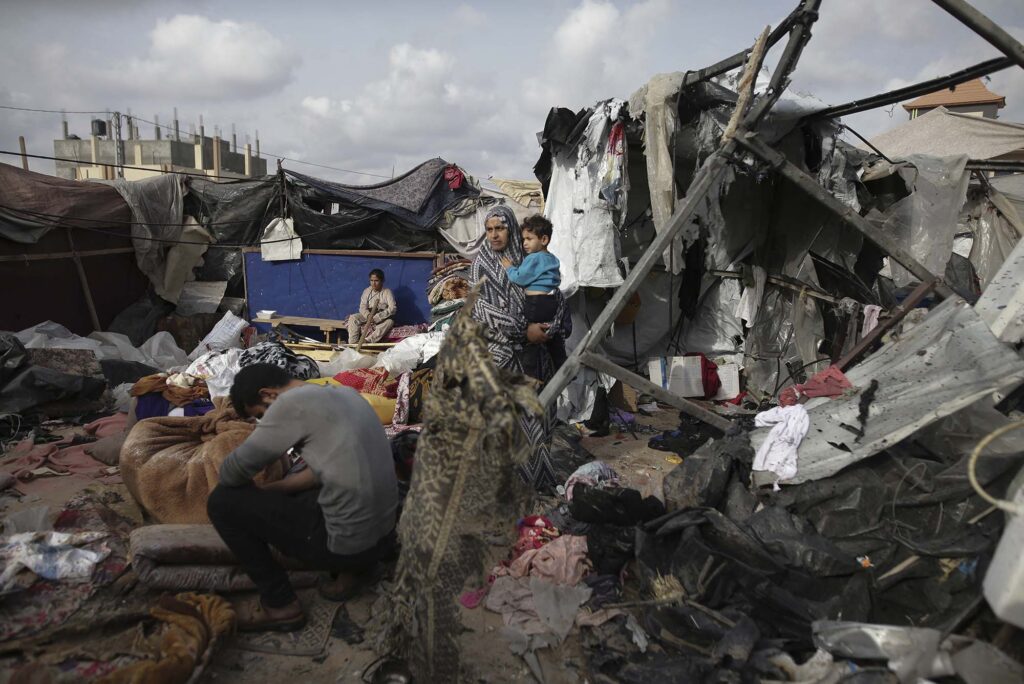Is Israel Committing Genocide in Gaza? Case Study
FEATURED RESEARCH PAPER, 1 Jul 2024
Alene Bouranova | Boston University Today - TRANSCEND Media Service

An Israeli airstrike on a Southern Gaza refugee tent encampment in late May 2024 resulted in scenes of horrific destruction, killing at least 45 people and injuring dozens more. Weapons experts say the bomb used in the strike was US-made. Photo by Jehad Alshrafi/AP Photo
New Report from BU School of Law’s International Human Rights Clinic Lays Out Case
The report comes from researchers at the University Network for Human Rights, a consortium of human right centers.
5 Jun 2024 – One question that has been fiercely debated and argued in the eight months since the violent and deadly attack against Israel by Hamas on October 7, 2023, is whether Israel’s swift counteroffensive has reached a point where it could be defined as a deliberate genocide.
Now, an “objective, methodological, and detailed analysis” conducted in part by the Boston University School of Law’s International Human Rights Clinic as part of a report from the University Network for Human Rights (UNHR), a consortium of human rights centers at colleges across the world, has released its finding.
The UNHR report, released in mid-May, concludes: “Israel has committed genocidal acts, namely killing, seriously harming, and inflicting conditions of life calculated, and intended to, bring about the physical destruction of Palestinians in Gaza,” says Susan Akram, a LAW clinical professor of law and director of LAW’s International Human Rights Clinic, who contributed to the report.
The report was researched and written by UNHR members from LAW’s International Human Rights Clinic, the International Human Rights Clinic at Cornell Law School, the Centre for Human Rights at the University of Pretoria in South Africa, and the Lowenstein Human Rights Project at Yale Law School.
The report’s conclusions are based on internationally agreed upon definitions of genocide. “As set forth in the Genocide Convention of 1948,” the report reads, “the crime of genocide requires that a perpetrator kill, seriously harm, or inflict conditions of life calculated to bring about the destruction of a group, in whole or in part, with the intent to destroy the group as such.” The report continues: “after reviewing the facts established by independent human rights monitors, journalists, and United Nations agencies, we conclude that Israel’s actions in and regarding Gaza since October 7, 2023, violate the Genocide Convention.”
The UNHR report comes at a time when Israel is drawing increasing global condemnation for its acts following the October 7 Hamas attack that killed an estimated 1,200 Israelis and saw another 250 taken hostage. Over 36,000 Palestinians have been killed in the Israeli military’s counter-offensive against Hamas, including more than 14,000 children, according to recent estimates from the Gaza Health Ministry. Israel has faced, and repeatedly denied, accusations of deliberately targeting civilians, aid workers, and refugee camps—such as a recent gruesome and deadly strike on a tent encampment—and purposely creating starvation conditions in Gaza.
In recent weeks, the International Court of Justice (ICJ), the United Nations top court, ordered Israel to halt its military offensive in Rafah, Gaza’s southernmost city, where an estimated 1.5 million displaced Palestinians have taken refuge. The International Criminal Court (ICC), an intergovernmental organization and tribunal, moved to file arrest warrants for Israeli Prime Minister Benjamin Netanyahu and Minister of Defence Yoav Gallant for war crimes and crimes against humanity, as well as for Hamas leaders Yahya Sinwar, Mohammed Deif, and Ismail Haniyeh.
At the end of May, US President Joe Biden announced a new three-part Israeli proposal for a permanent ceasefire.
The UNHR does not excuse the atrocities committed by Hamas in October, Akram says. Rather, the network’s report examines Israel’s argument of self-defense and the tactics the Israeli military has deployed in combating threats from Hamas.
“Self-defense is not an excuse to commit genocide,” Akram says. “Self-defense must conform to international humanitarian law, which requires an armed force to meet the criteria of necessity, proportionality, and distinction. Israel’s actions fail the tests of humanitarian law.”
Akram spoke to BU Today about the report, the obstacles to a ceasefire, and what the UNHR thinks the international community needs to do going forward. This interview has been edited and condensed for clarity.
This interview has been edited and condensed for clarity.
Q&A with Susan Akram
BU Today: Can you walk us through how the UNHR compiled the report?
Akram: The methodology was the usual for an objective analysis of a legal case: taking the legal elements, one by one, marshaling the credible available factual evidence, and applying that to each legal element and drawing conclusions on whether each element has been met. The source of the law is the crime of genocide under both the [UN’s] Genocide Convention of 1948 and the [ICC’s] Rome Statute that incorporate the same legal elements. Our aim was to provide a detailed analysis from experts of human rights and humanitarian law.
The report provides an objective, methodological, and detailed analysis of the most credible available evidence—primarily from UN and authoritative international sources—applied to the legal elements of genocide. The report incorporates a thorough review of prior jurisprudence from international courts and tribunals on each element to draw its conclusions.
What are the major takeaways of the report, in your opinion?
Between October 7, 2023, and May 1, 2024—the period covered in our report—Israel has killed at least 34,000 Palestinians and injured over 78,000 in Gaza, comprising over 5 percent of Gaza’s population. Of those killed, [around] 14,000 are children—more children in the first four months of Israel’s assault than have been killed in all the world’s conflicts in the last four years. Over 75 percent of Gaza’s population has been forcibly displaced in violation of Geneva Convention rules. Most face acute hunger and many are dying of famine. These are the results of Israel’s complete siege on Gaza, deliberately depriving an entire population of food, water, fuel, and other necessities for survival. In addition, Israel has destroyed over 70 percent of housing in Gaza, every single university, fully or partially destroyed hospitals, health centers, UN facilities, and most of Gaza’s religious and cultural institutions. All of this factual evidence supports the elements of genocide.
What are some of the biggest obstacles to enacting a ceasefire?
Law and politics are intertwined, but they aren’t the same. I can’t pretend to be an expert on the political considerations of the parties involved. But I can make a few observations about the weaknesses of the international legal framework in enforcing a ceasefire.
First, the International Court of Justice has provisionally ruled thrice already that Israel is engaging in genocidal acts in Gaza. It has ordered that Israel must end its siege on Gaza, open the borders and allow water, food, fuel, and other necessities to enter Gaza without hindrance. Israel has ignored these rulings. Since Hamas is not a party to the proceedings at the ICJ, the Court could not order a ceasefire. Second, the UN General Assembly has passed ceasefire resolutions multiple times by overwhelming majority vote, but these have been blocked by the United States’ veto at the Security Council. Under the UN Charter, only the Security Council can enforce resolutions, and only five countries have the ultimate vote on such measures.
As long as it has the unlimited backing of the United States at the UN, and ongoing support from a handful of Western states, Israel appears to believe it can ignore orders from the highest court in the world. On the Hamas side, there is also little incentive for a ceasefire if the end result is that Israel continues its occupation and Palestinians continue to be denied self-determination and an independent state.
For all of the condemnation of Israel’s actions, there is also strong opposition to Israel’s actions being labeled a genocide. Where does that pushback come from?
The opposition is political, as there is consensus amongst the international human rights legal community, many other legal and political experts, including many Holocaust scholars, that Israel is committing genocide in Gaza.
The opposition is from Israel, which has never accepted claims that it has committed atrocities—claims which have been made for decades for its actions as an occupier of Palestinian territory—and repudiates charges of war crimes and genocide. Israel has almost unconditional backing from the United States, and has military and other support from the United States, United Kingdom, Germany, and a few other Western states. The United States and the United Kingdom have condemned claims of genocide against Israeli leaders, including the orders of the ICJ and the ICC seeking arrest warrants.
What does the UNHR team think the global community needs to do to ameliorate the crisis?
Our report calls for immediate and complete compliance with the ICJ’s provisional orders: that Israel’s violations of the international legal prohibition of genocide and other related crimes amount to grave breaches of peremptory norms of international law that must be ceased immediately. In addition, because genocide is the most serious of international crimes, these violations give rise to obligations by all other states [that are] parties to the Genocide Convention—153 states to date, including the United States, Israel, and Palestine. This means that a finding of genocide, or the possibility that genocide may be occurring, triggers obligations on all other states to take steps to prevent it and to ensure non-complicity with it.
Our report ends with a review of what this means to the world community of states: to stop all aid and assistance to Israel’s military operations in Gaza, to refrain from dealings with Israel that imply that its actions are legal, and to punish Israeli principals who are ordering or engaging in genocidal acts.
Read the full report HERE
_________________________________________________
 Alene Bouranova is a Pacific Northwest native and a BU alum (COM’16). After earning a BS in journalism, she spent four years at Boston magazine writing, copyediting, and managing production for all publications. These days, she covers campus happenings, current events, and more for BU Today. Fun fact: she’s still using her Terrier card from 2013. When she’s not writing about campus, she’s trying to lose her Terrier card so BU will give her a new one. She lives in Cambridge with her plants. Profile – She can be reached at abour@bu.edu
Alene Bouranova is a Pacific Northwest native and a BU alum (COM’16). After earning a BS in journalism, she spent four years at Boston magazine writing, copyediting, and managing production for all publications. These days, she covers campus happenings, current events, and more for BU Today. Fun fact: she’s still using her Terrier card from 2013. When she’s not writing about campus, she’s trying to lose her Terrier card so BU will give her a new one. She lives in Cambridge with her plants. Profile – She can be reached at abour@bu.edu
FEATURED RESEARCH PAPER STAYS POSTED FOR 2 WEEKS BEFORE BEING ARCHIVED
Tags: Anglo America, Colonialism, Crimes against Humanity, Ecocide, Ethnic Cleansing, Famine, Gaza, Genocide, Genocide Convention, Hamas, Hunger, International Court of Justice ICJ, International Criminal Court ICC, Israel, Israeli Apartheid, Israeli occupation, Massacre, Palestine, Protests, Rafah, Students Anti-Genocide Gaza, USA, United Nations, War crimes, West Bank, Zionism
DISCLAIMER: The statements, views and opinions expressed in pieces republished here are solely those of the authors and do not necessarily represent those of TMS. In accordance with title 17 U.S.C. section 107, this material is distributed without profit to those who have expressed a prior interest in receiving the included information for research and educational purposes. TMS has no affiliation whatsoever with the originator of this article nor is TMS endorsed or sponsored by the originator. “GO TO ORIGINAL” links are provided as a convenience to our readers and allow for verification of authenticity. However, as originating pages are often updated by their originating host sites, the versions posted may not match the versions our readers view when clicking the “GO TO ORIGINAL” links. This site contains copyrighted material the use of which has not always been specifically authorized by the copyright owner. We are making such material available in our efforts to advance understanding of environmental, political, human rights, economic, democracy, scientific, and social justice issues, etc. We believe this constitutes a ‘fair use’ of any such copyrighted material as provided for in section 107 of the US Copyright Law. In accordance with Title 17 U.S.C. Section 107, the material on this site is distributed without profit to those who have expressed a prior interest in receiving the included information for research and educational purposes. For more information go to: http://www.law.cornell.edu/uscode/17/107.shtml. If you wish to use copyrighted material from this site for purposes of your own that go beyond ‘fair use’, you must obtain permission from the copyright owner.
Join the discussion!
We welcome debate and dissent, but personal — ad hominem — attacks (on authors, other users or any individual), abuse and defamatory language will not be tolerated. Nor will we tolerate attempts to deliberately disrupt discussions. We aim to maintain an inviting space to focus on intelligent interactions and debates.
Read more
Click here to go to the current weekly digest or pick another article:
FEATURED RESEARCH PAPER: